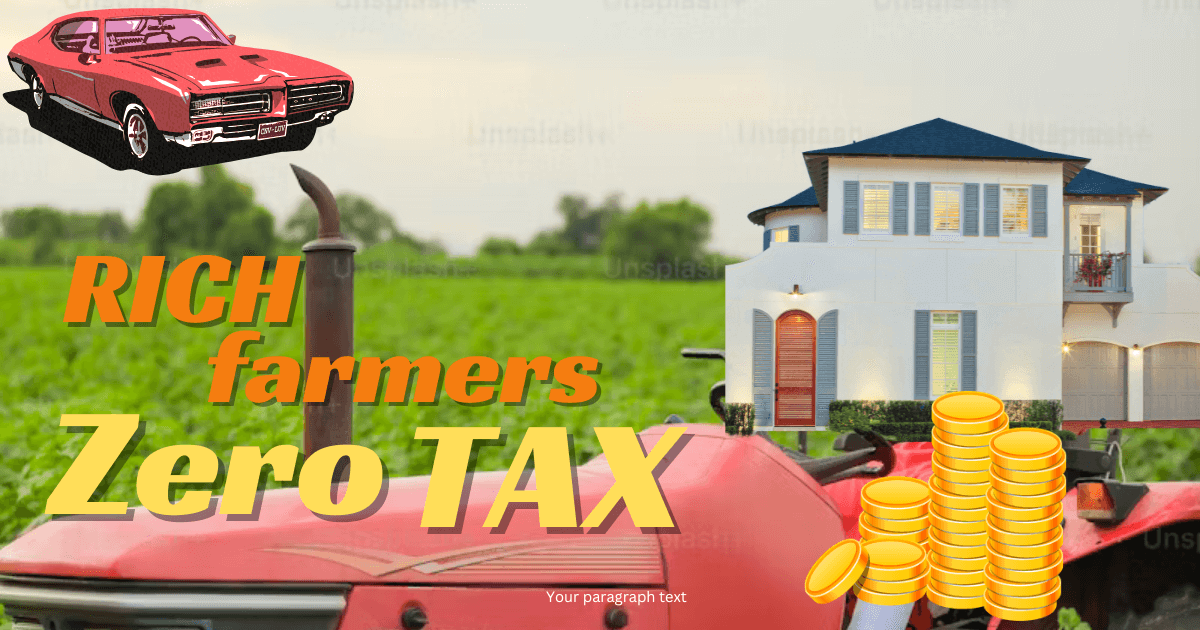RICH Indian farmers pay ZERO income tax: Should Agricultural Income Be Taxed in India?
India’s middle class often feels the pinch of taxation, especially as discussions around the country’s budget and tax reforms dominate public discourse. One recurring question is: why is agricultural income tax-free, even for RICH Indian farmers? With only 2% of India’s population paying income tax compared to 40-80% in developed nations, this issue has become a lightning rod for debate. Let’s delve into the complexities of this contentious topic.
Chapter 1: The Tax Burden on the Middle Class
India’s salaried employees bear a disproportionate share of the tax burden. They pay income tax on their earnings, followed by GST on expenditures, capital gains taxes on investments, TCS on foreign travel, and customs duties on imports. Meanwhile, agricultural income, regardless of scale, remains tax-free. This discrepancy raises fundamental questions of fairness, particularly for affluent Rich Indian farmers who earn crores annually.
In countries like China (40% taxpayers), the USA (50%), and Canada (80%), the tax base is significantly broader. India, with its narrow base, places an immense load on honest taxpayers. Increasing the tax base is essential, and taxing high agricultural incomes ( Rich Indian Farmers ) could be a step in that direction.
Chapter 2: Why Isn’t Agricultural Income Taxed?
The exemption of agricultural income from tax isn’t arbitrary. It’s rooted in history, legality, ethics, and politics.
1. Historical Context
Under British rule, farmers were heavily taxed irrespective of crop yields or market conditions. This exploitative system contributed to widespread poverty and hunger. Post-independence, to alleviate the plight of farmers and encourage agricultural growth, income from farming was made tax-free.
2. Legal Constraints
Agriculture is a state subject in India, meaning states, not the central government, have the authority to impose taxes on it. Efforts to tax agriculture, like Kerala’s 1991 Agricultural Income Tax Act on cash crops, were repealed due to backlash. Changing this would require amending the Constitution, a politically risky endeavor.
3. Ethical Considerations
Farming is inherently risky, with incomes dependent on unpredictable factors like rainfall, climate change, and market conditions. Many farmers barely earn enough to sustain their families. Taxing their meager earnings would be unjust.
4. Political Implications
Farmers form a significant voting bloc, and taxing them could lead to widespread unrest. Political parties, reliant on farmers for support and funding, avoid such proposals. Additionally, any attempt to tax agricultural income is likely to be met with media scrutiny and public outrage, making it a near-impossible reform.
Chapter 3: Are Farmers Really Untouched by Taxes?
Contrary to popular belief, agricultural income isn’t entirely exempt. The income tax department indirectly taxes agricultural income by combining it with non-agricultural income to determine the applicable tax slab. For instance, if someone earns ₹50 lakhs from farming and ₹10 lakhs from a job, their tax on non-agricultural income is calculated at the higher slab rate of their combined income (₹60 lakhs).
However, this only applies when agricultural income is declared. The prevalence of cash transactions in farming makes it difficult to track, leaving loopholes for tax evasion. Wealthy individuals often exploit these exemptions, converting black money into white through “rooftop farming” or buying farmhouses under the guise of agriculture.
Chapter 4: The Bigger Picture
India’s average farmer earns a paltry income, often insufficient to meet basic needs. According to data, most farmers wouldn’t fall under taxable brackets even if agricultural income were taxed. The real culprits are the wealthy farmers (so called RICH Indian Farmers) and influential individuals misusing these exemptions.
Taxing agricultural income isn’t just about fairness; it’s about strengthening the economy. A broader tax base means more revenue for public goods like schools, roads, and healthcare. The government must prioritize targeting those exploiting loopholes while safeguarding small farmers. Politicians, too, must ensure that taxpayer money is spent transparently and effectively, fostering trust among citizens.
Conclusion: A Call for Balanced Reform
India’s tax system needs an overhaul. Taxing the affluent—whether they’re RICH Indian farmers, industrialists, or politicians—is vital to create a fair and equitable society. The focus should be on:
- Identifying and penalizing those misusing agricultural exemptions.
- Increasing transparency and accountability in government spending.
- Ensuring that taxation policies support economic growth without disproportionately burdening any one segment of society.
Taxation should reflect the principle that every capable individual contributes to nation-building. Only then can we achieve a truly inclusive and prosperous India. Let’s work toward a system that respects taxpayers and ensures every rupee is spent wisely—a system where fairness, equity, and progress go hand in hand.
ALSO READ
Follow me on Twitter (X) or Facebook. Join WhatsApp Channel or Facebook Group for Updates.
Liked our article ? Subscribe to get weekly updates

